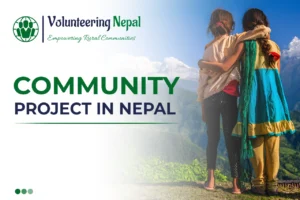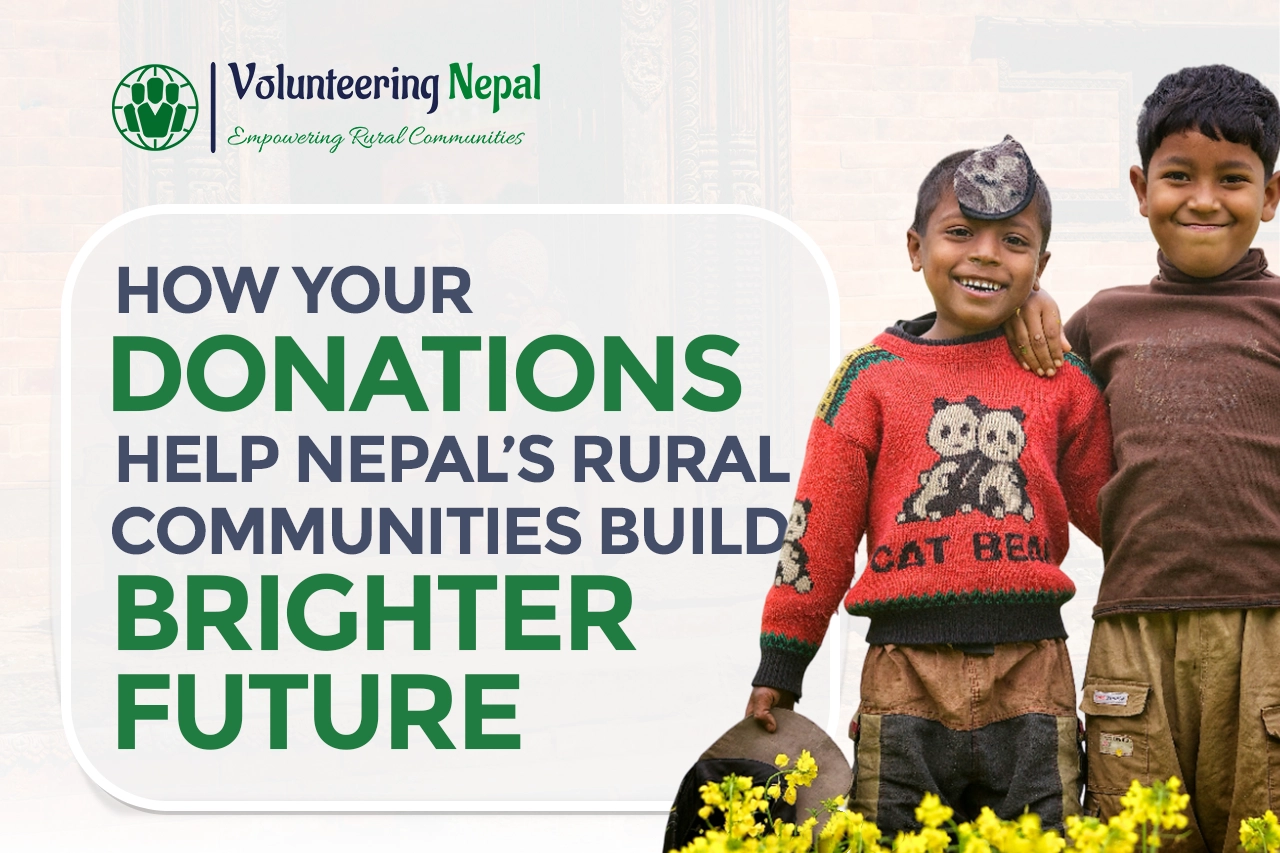
How Your Donations Help Nepal’s Rural Communities
When an average person thinks of Nepal, they think of snow-top mountains, prayer flags blowing in the wind, or hikers going to the base camp of Everest. But there is an alternative Nepal – one you would not see in picture post cards or in the loop of Instagram. It is this Nepal, the one that has villages, remote villages, that lie off the tourist trail, paths cutting through terraced hills, steady as stone and hearts chiselled in rugby-ball houses.
With your donations, the rural communities of Nepal are in a better position to develop a better future. They promote the availability of clean water, good education as well as sustainable livelihoods to the most deserving families. Whether you want to volunteer in Nepal, contribute to a worthy cause or give long-term development, opportunities to have an integrated impact can be found in rural communities.
In the following guide, you will find the ways how donations and volunteering activities contribute to the development in the field of education, healthcare, sanitation, and agriculture. You will also visit Nepal volunteer programs, which are aimed at international guests, the USA, UK, Canada, etc.-those programs that will establish authentic, sustainable networks and transformation.
Rural Communities in Nepal
The best way to see how contributions and volunteering bring a difference is to analyze what exactly rural neighborhoods in Nepal are.
What are Nepal’s Rural Communities?
Nepal’s rural communities are densely-settled rural villages who mainly engage in agricultural activities and are often not centred within municipalities. Such villages are not usually provided with the infrastructure of big cities where electric energy is unreliable, clean water has to be carried by hand, and the internet connection is unavailable.
Nonetheless, they may not be too convenient, but one can never deny them communal power, cultural density and resilience. Such villages are based on collective responsibility.
There is resource sharing among the families, cooperation in the planting process and the harvest period as well as the management of schools or forests by a local committee. Though things are tough, life is highly social.
Education: Changing generations, child by child
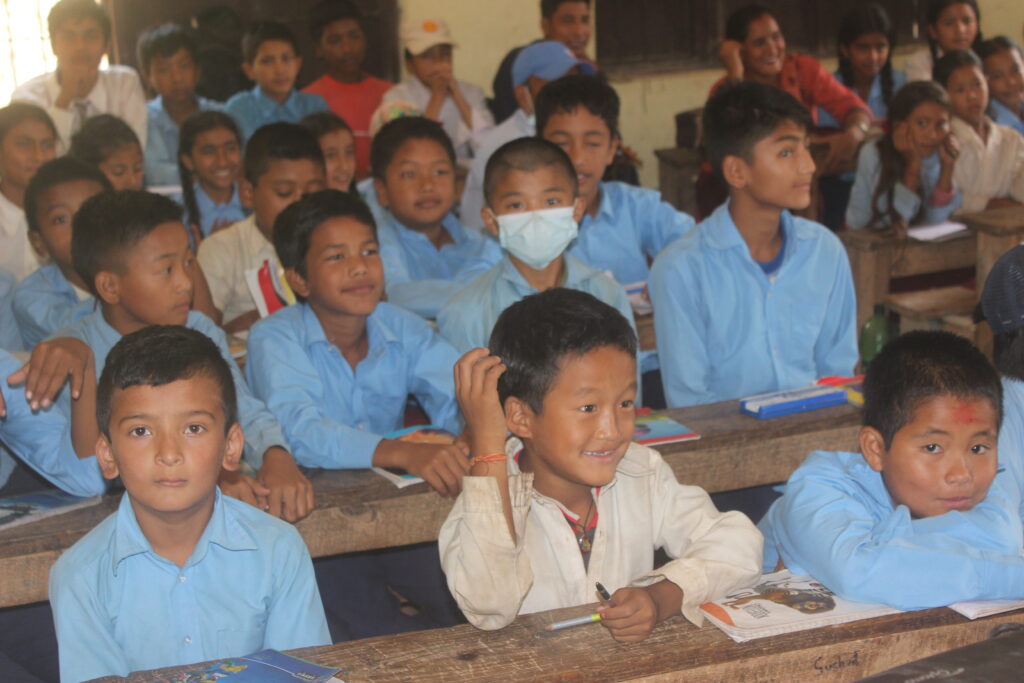
Learning is the foundation of sustained transformation, and even a modest amount of educational assistance can reverberate throughout generations within Nepal’s rural communities.
The Strength of a simple desk
Students in Lamjung hills or in Rukum valleys sit on floors or broken benches in shabby classrooms. They do not have textbooks, notebooks, or even qualified teachers. With a small donation of only 50 to 100 dollars, one can:
- Buy textbooks for a whole classroom
- Provide sanitary kits and school uniforms to girls
- Rebuild and repaint deteriorating infrastructure
NGOs such as Volunteering Nepal work directly with the communities to bring changes. They make sure that girls, who are usually left behind, get full scholarships, uniforms, and menstrual hygiene kits, which are the key to school attendance.
“One mother in Mustang says her daughter would have remained at home. She now dreams of becoming a nurse.”
Volunteer Opportunities Nepal: Be an Ally in Education
International participants can also join Nepal volunteer programs and teach English, assist with after-school activities, or participate in classroom renovations. There are such options as family volunteer Nepal, gap year volunteer Nepal and Solo Volunteer Nepal, which provide direct access to students and teachers in remote villages.
Water, Sanitation & Health: Time and Dignity Lost and Found
Clean water and basic healthcare are not only a necessity, but also a question of dignity, opportunity, and getting back precious time for rural families in Nepal.
Water is Freedom
In most villages, it does not take five minutes to fetch water, it is a two hour round trip, several times a day, and generally done by women and girls. This cost of time does not allow girls to go to school, causes fatigue, and perpetuates poverty cycles.
Donation-supported infrastructure projects such as those by Elevate Nepal build gravity-fed water systems and tap stands that decrease this time to zero. Girls go back to school. Households have improved hygiene. Water borne diseases are reduced.
The Healthcare Gap in Nepal’s Rural Areas
Since government hospitals are usually located in small, rural areas, and there are not enough of them and they are too distant, the mobile medical camps are resorted to by many. The Dr. Om Foundation takes doctors and nurses to the remotest locations, offering:
- Prenatal care
- Dental Services
- General checkups
- Basic medications
Supplies, transportation and even life-saving procedures are financed using donations.
Medical & Health Projects: Volunteering Nepal
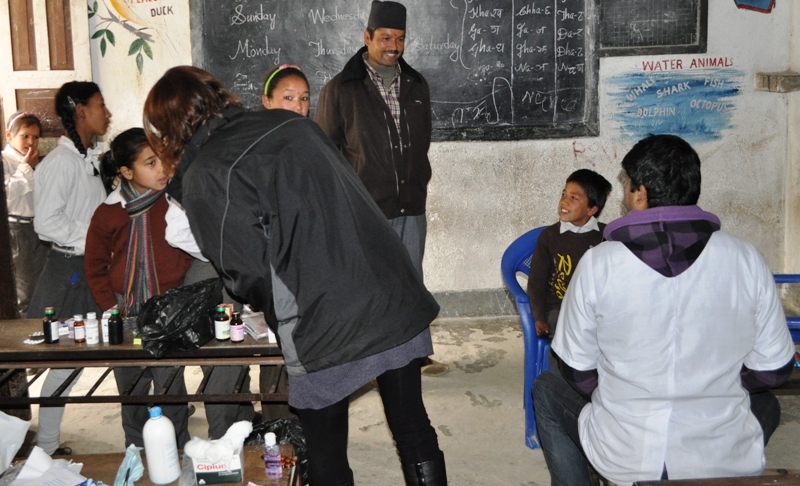
If you work in healthcare, professional volunteer Nepal programs will give you an opportunity to volunteer in clinics, help with health education, or even provide virtual telemedicine consultations to distant patients.
Solar Powered Pathway
Solar energy is not just light in a community where electricity is a luxury, it is safety, education and hope of a better future.
Clean Energy as an Alternative to Kerosene
In off-villages, silence is darkness. Children are unable to study and families use kerosene lanterns that are hazardous, poisonous and expensive. There comes the Solar Tuki- a 15 dollar solar powered lamp that changes lives.
More than 130,000 units have already been distributed. These lamps:
- Let kids learn at night
- Enhance indoor air quality
- Lower fire hazards
- Save money for families in the long run
Gap Year Nepal Volunteer: Lighting Up Nepal
Solar distribution and education is frequently a part of the Gap Year Volunteer Nepal programs. The change is local and sustainable because the equipment is not only delivered by volunteers but also taught to families on how to maintain it.
Lifeline Connectivity
Nowadays, connectivity is not a luxury but a lifeline, particularly in Nepalese rural areas, where the internet may be the key to education, healthcare, and economic survival.
Access to the Internet in Remote Villages
It is not only physical distance, but digital as well. The majority of Nepal’s rural communities are not connected to the internet, which means they are isolated in terms of education, healthcare, and economic possibilities. That’s why telehealth in rural communities is game-changing.
Mahabir Pun is the founder of the Nepal Wireless Networking Project, which deploys Wi-Fi mesh networks to provide internet access to schools and clinics. These associations are in favor of:
- Tele-diagnosis and therapy
- Student Online Courses
- Local farmers e-commerce
In one instance, a Kathmandu-based doctor diagnosed a life-threatening case of appendicitis in a woman through Skype, and saved her life.
Nepal Internship Volunteer: Tech for Good
Nepal internship volunteer programs allow IT professionals, teachers, and even students to volunteer in the country and establish digital labs, provide coding courses, or support the telemedicine system in rural locations.
Vocational Training: Skills for Sustainable Livelihoods
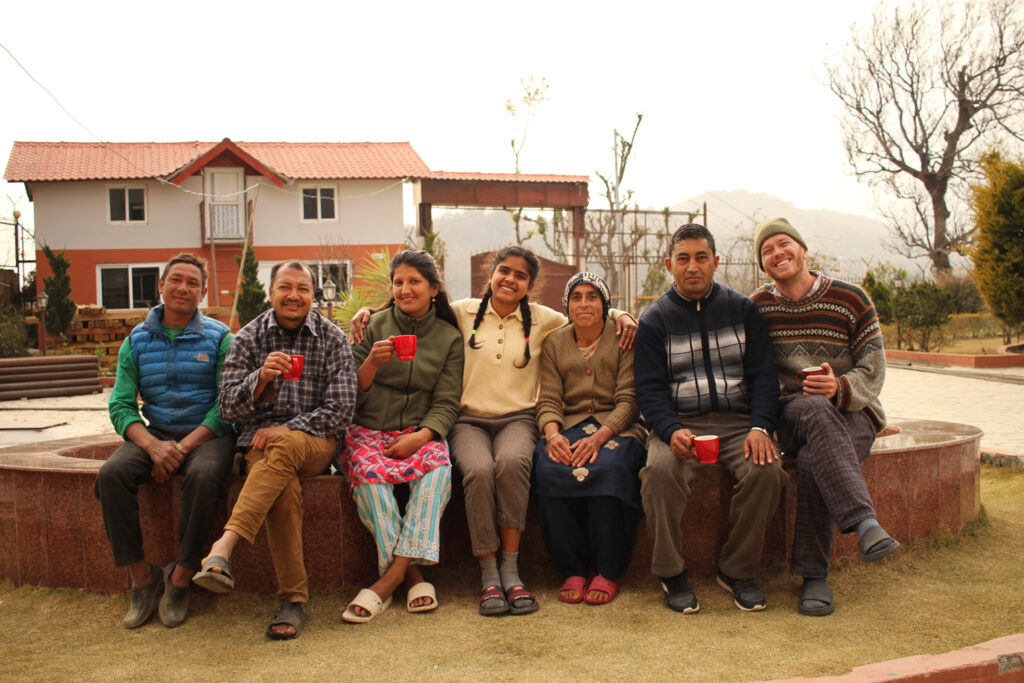
Better Than Schooling–It is a Job. Education is essential, and job-ready skills are revolutionary. In Nepal, vocational training is benefiting thousands of people, particularly women and marginalized groups, to make a living in rural Nepal.
Programs include:
- Tailoring and weaving
- Masonry and carpentry
- Solar maintenance
- Agricultural innovation
In one report, the income of the participants rose by 31 percent within one year of training.
Volunteer Abroad Nepal: Mentorship Matters
Qualified professionals are allowed to volunteer in volunteer abroad Nepal projects and they can mentor in:
- Digital literacy
- Business Planning
- Resume writing
- Job coaching
The programs are especially effective with the rural black population and women who want to become economically independent.
Sustainability in Community Forestry and Agriculture: Sustainability in Action
The grassroots of sustainability in rural Nepal is the management of forests by the communities and the transformation of agriculture to achieve sustainability of livelihoods as well as the environment.
Locally Managed Forests
The community forestry model in Nepal enables the villagers to control their forests. They reforest, stop erosion and practice sustainable use of the land- generating revenue and conserving the environment.
Such initiatives have seen millions of hectares of forestland restored by such grassroots initiatives, which have demonstrated that conservation and livelihood are not mutually exclusive.
Agriculture as Business
Farmers have access to greenhouses, seed banks and livestock, and are shifting to small agribusiness. The donations assist in the provision of:
- Farms of goats or chickens
- Organic vegetable gardens
- Beekeeping kits
- Micro-irrigation systems
The group’s volunteer Nepal projects tend to concentrate on such activities, helping the whole communities to become more food-secure and financially independent.
The Cultural Pillar of Rural Philanthropy: Rooted Giving
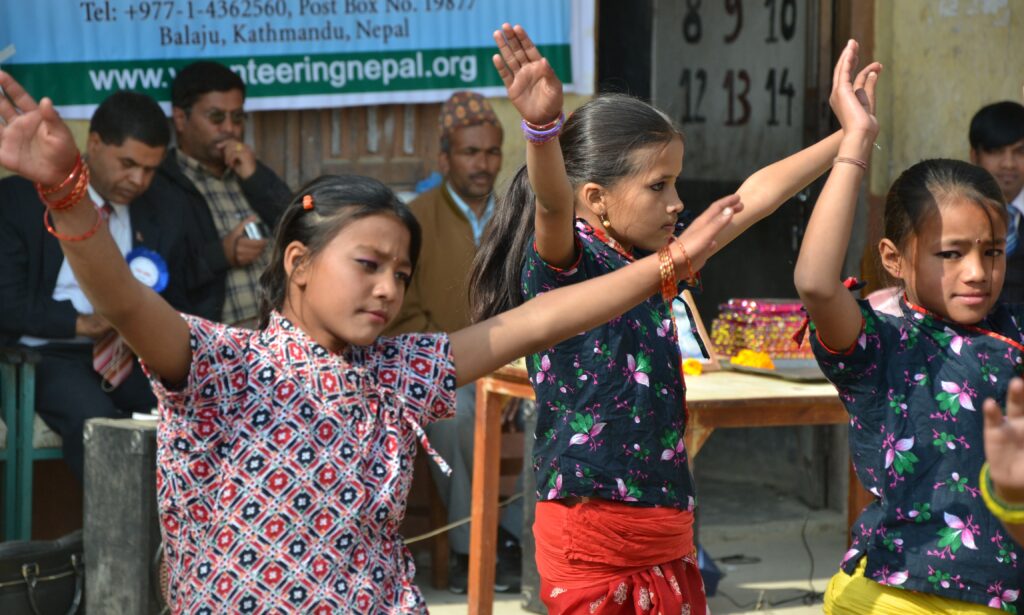
The culture of giving in Nepal is not only a charity, but it is a community value where generosity is the core of the rural society.
The act of giving is sacred.
Giving is not alien in Nepal, it is sacred. Such customs as daan (alms) and bhiksha (offering) show a strong culture of sharing and compassion.
That is why foreign aid which takes into consideration the local practices works better. The best donations and volunteer activities are the ones that do not replace local leadership but rather supplement it.
Retired Volunteer Nepal: Wise Life
Retirees usually come with priceless experience to projects. Retired volunteer Nepal programs connect professionals with community leaders to mentor them in administration, governance and sustainability.
The programs are constructed on the basis of collaboration, rather than control, which suits the Nepali values of mutual respect.
Ways Top Nepal Volunteer Programs Create Lasting Change
Not every volunteer program is the same. The following principles are followed by the most successful Nepal volunteer programs and NGOs:
- Local-led projects
- Openness of expenditure
- Feedback loops in the community
- Dependency is not capacity-building
Companies such as Volunteering Nepal are leaders in this model. Your money does not disappear, it grows, educates and strengthens.
Who Can Make a Difference?
Whether you’re a student, professional, family, or retiree, there’s a role for you in Nepal’s development story.
| Type of Supporter | Best Fit Opportunity |
| Family Volunteer Nepal | Teach, build schools, garden, assist in classrooms |
| Group Volunteer Nepal | Water systems, solar distribution, health camps |
| Solo Volunteer Nepal | Work in women’s empowerment, animal rescue, or small NGOs |
| Gap Year Volunteer Nepal | Combine travel with impact—perfect for post-graduates |
| Professional Volunteer Nepal | Teach digital skills, offer health services, run workshops |
| Retired Volunteer Nepal | Mentor local leaders, help with NGO strategy or policy planning |
| Nepal Internship Volunteer | Gain academic credit, career skills, and cultural insight |
Frequently Asked Questions
What is volunteering in Nepal like?
The experience of volunteering in Nepal is the experience of living in rural communities where you can contribute directly to education, health, sustainability, and women’s rights. You live with locals, make a difference, and you get a world view.
What’s the definition of rural communities in Nepal?
They are rural and mostly mountainous areas beyond the municipalities of cities. These regions are poorly infrastructured yet have well-established communities and cultures.
How can I get involved in Nepal charity work?
You may give funds to established NGOs, sponsor a child, fund a solar or water initiative or go on-site as a volunteer. Select programs that are clear and community-based.
Are there grants for small rural communities?
Yes. A lot of NGOs collaborate with local governments to get grants for recreation, agriculture or telehealth initiatives revitalizing remote villages and bettering livelihoods.
Final Thoughts: From Donor to Catalyst
Rural Nepal is not about charity, it is about partnership. Your giving does not only construct a classroom or provide clean water. It restores self-respect. It sows opportunity seeds. When you decide to volunteer in Nepal, you will be in a community of people around the world who are working to co-create a brighter future.
And in exchange, you will get a very rare thing: a different perspective of the world and how you fit in it.
Are you prepared to change the world?
Donate Today or Join Us as a volunteer and contribute to the future one life, one village at a time.

